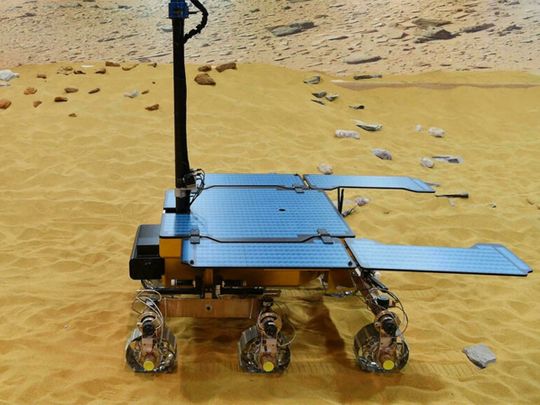
Paris: A Russian-European mission to land a rover on Mars has been suspended due to the Kremlin's attack on Ukraine, the European Space Agency announced Thursday, as Moscow said it regretted the "bitter" decision.
The ExoMars mission had been set to use a Russian launcher later this year to send a European rover to drill for signs of life on the Red Planet.
However, the ESA said the crisis in Ukraine and sanctions against Moscow had forced it to cease cooperation with Russia and look for another way to launch ExoMars and four other missions using Russian rockets.
"We deeply deplore the human casualties and tragic consequences of the aggression towards Ukraine," the agency said in a statement.
"While recognising the impact on scientific exploration of space, ESA is fully aligned with the sanctions imposed on Russia."
The head of Russia's space agency Roscosmos, Dmitry Rogozin, called the decision a "shame".
"This is a very bitter (decision) for all the enthusiasts of space," Rogozin said on Telegram.
He said the project "would lose several years" but that Russia would "conduct this research expedition on our own".
He added it would be done "without any 'European friends' with their tails tucked because of American shouting."
Delay until at least 2026
Roscosmos had responded to EU sanctions last month by suspending launches and withdrawing more than 100 of its workers from Europe's spaceport in French Guiana's Kourou.
ExoMars had originally been planned for 2020 but was postponed due to the Covid-19 pandemic.
It had been set to launch in September from the Baikonur Cosmodrome in Kazakhstan by a Russian Proton rocket, then taken down to the Martian soil by Russia's Kazachok lander.
Getting the Rosalind Franklin rover, named after an English chemist and DNA pioneer, to Mars will now be heavily delayed as the window to launch only comes around every two years.
After meeting in Paris on Thursday, the ESA's ruling council said its director general Josef Aschbacher would "carry out a fast-track industrial study to better define the available options for a way forward to implement the ExoMars rover mission".
"This year the launch is gone," Aschbacher told a press briefing.
He said a launch was now not possible until at least 2026, adding that "cooperation with NASA is an option" that the ESA would look into.
All ESA missions using Russia's Soyuz rocket have also been suspended, the agency said.
They include two satellites for Europe's Galileo GPS system, the Euclid space telescope mission, the European-Japanese EarthCARE observation satellite and a French military satellite.
ISS 'stable and safe'
The search for alternatives to launch these missions would involve "a review of the Ariane 6 first exploitation flights", the ESA said.
The first flight using the European launcher, which will replace the Ariane 5, is scheduled by the end of this year, and a reshuffle could have knock-on effects for other planned missions.
Aschbacher emphasised the importance of "establishing a very fast ramp up" of the Ariane 6.
He also said ESA would hold an extraordinary council meeting in the coming weeks for proposals on its upcoming missions.
He said "we have to unravel" the work ESA has done with Russia, which began as the West sought closer ties with Moscow in 1990s following the dissolution of the Soviet Union.
The International Space Station was one of the greatest symbols of post-Cold War cooperation between Russia and the West.
On the weekend, Rogozin again warned that Western sanctions against Moscow could cause the ISS to crash - the Russian segment is vital for the station's propulsion and attitude control.
However, Aschbacher said that ISS operations were "stable and safe", adding that "the astronauts are working nominally".












